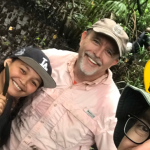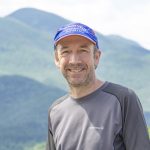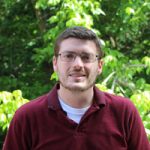SE CASC Winter 2021 Science Seminars
Join us this fall/winter for a virtual science seminar series highlighting SE CASC funded projects supporting resource management actions across the Southeast. Each month SE CASC researchers will provide an overview of their work and the management implications of their research findings. Explore our collection of Science Seminar Series recordings here.
Science to Inform the Management of Mangrove Ecosystems Undergoing Sea Level Rise at Ding Darling National Wildlife Refuge, Sanibel Island, Florida
Dr. Ken Krauss, USGS Wetland and Aquatic Research Center
January 19, 2022 | 11AM ET
View a recording of this presentation.
Webinar Overview:
Mangrove ecosystems exist within the intertidal plane, and respond to sea-level rise by trapping mineral sediments and through belowground productivity. Both can become altered by land use change and increase the vulnerability of coastal wetlands by altering their subtle, but sustaining, elevation balance. Managers with the US Fish and Wildlife Service (FWS) have become increasing concerned about persistent nutrient loading into the mangrove forests of Ding Darling NWR through the Caloosahatchee River watershed, which drains agricultural and municipal areas. I will present an overview and preliminary results of a study conducted by U.S. Geological Survey, FWS, and university scientists to understand how areal mangrove coverage, soil surface elevation, and productivity might have been altered by nutrient loading, and whether such loading provides increased vulnerability for these mangroves to sea-level rise and hurricanes. Experimental studies involved nutrient amendments to large trees of mangrove basins (10-12 m tall), and included sapflow assessment as a measure of on-going eco-physiological stress. Our overall goal is to construct full carbon budgets from a synthesis of these data under different nutrient loading regimes, link that to potential vulnerabilities, and assist with ameliorative management actions for the refuge and larger watershed. Learn more about the SE CASC project associated with this work.
Learn more about the speaker:

Dr. Ken Krauss is a Physiological Ecologist and Wetland Scientist at the USGS Wetland and Aquatic Research Center in Lafayette, LA. His career began in the federal government with the USDA Forest Service in Mississippi at the Center for Bottomland Hardwoods Research and he then worked in Hawaii at the Institute of Pacific Islands Forestry. Ken’s research spans several habitats, from mangroves to tidal freshwater forested wetlands and marshes. His research takes a multi-tiered approach to understanding eco-physiological processes in coastal wetland forests; defining gas exchange between the soil and atmosphere, and among the leaf, tree, and atmosphere. Research has defined thresholds to tidal freshwater forested wetland habitat change in the face of persistent environmental drivers, specifically sea level rise and salinity, defined the potential of forested wetlands to influence water cycling in coastal areas, and has begun to establish the potential of other wetland types to contribute to water conservation, especially under drought and perennial salinization. Krauss also focuses on the vulnerability of coastal swamp forests and mangroves to sea-level rise, and on how science can inform management and restoration activity within the coastal zone.
Managing Waterfowl Harvest Under Climate Change: Time-Dependent Optimal Policies to Address Non-Stationary Dynamics
Dr. Michael Runge, Eastern Ecological Science Center at the Patuxent Research Refuge
December 1, 2021 | 4PM ET View a recording of this presentation.
Webinar Overview:
One of the central challenges for climate adaptation is anticipating changing dynamics in our management strategies. When and how should we act early to either mitigate or take advantage of the effects of a changing system? We explored this question in the context of setting waterfowl hunting regulations, using dynamic programming to find time-dependent optimal policies that account for, and indeed, anticipate, changes in the underlying demographic parameters. In this talk, we present results from a theoretical investigation of this question and discuss ongoing work with management agencies to apply the approach to waterfowl harvest management in the U.S. This webinar is co-hosted with the Northeast Climate Adaptation Science Center.
Learn more about the speaker:

Dr. Michael Runge is a research ecologist and decision analyst with the USGS Eastern Ecological Science Center at the Patuxent Research Refuge. His work focuses on integrating tools from the field of decision analysis with expertise in wildlife science to provide natural resource management agencies with relevant decision support.
Development and Evaluation of a Climate Visualization Platform Supporting Forest Management
Dr. Lindsay Maudlin, Iowa State University
Corey Davis, State Climate Office of North Carolina
November 17 | 11AM ET
View a recording of this presentation.
Webinar Overview:
The PINEMAP Decision Support System (DSS) is a web-based tool developed to help professional foresters assess future climate-based risks and opportunities for planted loblolly pine trees, which are fast-growing, long-lived, and highly effective at carbon sequestration. The PINEMAP DSS uses an innovative interface to display a range of future climate projections for variables of interest, including a three-map layout and a location-specific time series plot. As such, it necessitated an iterative development and usability testing process with stakeholders, forestry extension faculty, and climate scientists to ensure an effective and scientifically sound presentation of climate data. Part of this evaluation included an eye tracking study, which tracked the eye movements of participants as they completed tasks using the PINEMAP DSS and answered multiple-choice questions related to those tasks.
The PINEMAP DSS was evaluated for its overall usability. The evaluation involved tracking the eye movements of participants as they completed tasks using the PINEMAP DSS and answered multiple-choice questions related to those tasks. In addition to evaluating the overall usability, user factors such as gender, age, experience or content expertise, and performance on the multiple-choice questions were examined to determine if they had any influences on usability. After an initial evaluation (Phase 1), the DSS was updated to correct for the troublesome elements of the DSS, and a second phase (Phase 2) of evaluation took place to test whether the changes led to an increase in usability. Phase 1 participants were primarily professionals in the forestry field, and Phase 2 participants were undergraduates enrolled in an introductory physical science course at a large university in the Southeast US. Findings suggest: males and females interact with the PINEMAP DSS in different ways; age is a confounding factor in usability; experience and expertise in the field do not guarantee success in completing the tasks or perfect performance on the multiple-choice questions; and performance on the multiple-choice questions is strongly influenced by where and when participants visually fixate within the DSS. View a SE CASC web-post describing the results of this work.
Learn more about the speakers:

Dr. Lindsay C. Maudlin is an Assistant Teaching Professor of Climate Science in the Department of Geological and Atmospheric Sciences at Iowa State University. In addition to teaching climate-related courses, she recruits, advises, and mentors undergraduate students in a new, interdisciplinary, climate science undergraduate program. Lindsay’s research interests are in Atmospheric Science Education Research, and she specifically focuses on climate literacy in formal and informal education settings. She earned her PhD in Marine, Earth, and Atmospheric Sciences from North Carolina State University, during which time she was a SE CASC Global Change Fellow. View a SE CASC web-post describing the this work, written by Lindsay Maudlin.

Corey Davis is an Assistant State Climatologist at the State Climate Office of North Carolina. His work centers on science communication, including the development of web-based data visualization tools, writing and editing the Climate Blog about recent and past weather events in North Carolina, and presenting to community and professional groups about climate and its hazards. Corey received a Master’s degree in Atmospheric Science from NC State University in 2014, during which time he was a SE CASC Global Change Fellow.
